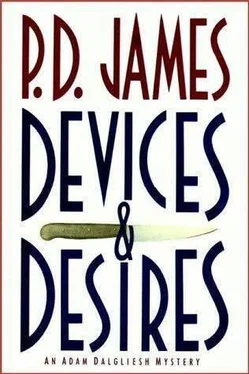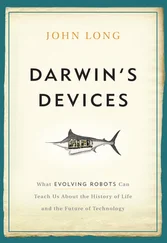'The shoes we are looking for are like this. Can you remember if a pair were ever in the jumble box and, if so, who brought them in?'
She said at once: 'I didn't realize they were called Bumbles but, yes, there was a pair like this in the box. Mr Miles Lessingham from the power station brought them in. He was asked to dispose of the clothes of the young man who killed himself at Larksoken. Two of the suits hanging up here also belonged to Toby Gledhill.'
'When did Mr Lessingham bring in the shoes, Mrs Dennison?'
'I can't remember exactly. I think it was late afternoon a week or so after Mr Gledhill died, sometime towards the end of last month. But you'd have to ask him, Chief Inspector. He may remember more precisely.'
'And he brought them to the front door?'
'Oh yes. He said he wouldn't stay to tea but he did have a word in the drawing room with Mrs Copley. Then he brought the suitcase of clothes out here with me and we unpacked them together. I put the shoes in a plastic bag.'
'And when did you last see them?'
'I can't possibly remember that, Chief Inspector. I don't come out here very often except occasionally to price up some of the clothes. And when I do I don't necessarily look in the shoe box.'
'Not even to see what's been brought in?'
'Yes, I do that from time to time, but I don't make any kind of regular inspection.'
'They're very distinctive shoes, Mrs Dennison.'
'I know that, and if I'd rummaged about in the box recently I must have seen them or even noticed that they were missing. But I didn't. I'm afraid I can't possibly say when they were taken.'
'How many people know about the system here?'
'Most of the headlanders know, and any staff at Larksoken Power Station who regularly donate jumble. They usually come by car, of course, on their way home and sometimes, like Mr Lessingham, ring at the front door. Occasionally I take the bags from them at the door or they may say that they'll drop them in at the back. We don't actually hold the jumble sale here, that takes place in the village hall in Lydsett in October. But this is a convenient collecting place for the headland and for the power station, and then Mr Sparks or Mr Jago from the Local Hero comes in a van and loads it up a day or two before the sale.'
'But I see you price up some of the stuff here.'
'Not all of it, Chief Inspector. It's just that occasionally we know of people who might like some of the items and who buy them before the sale.'
The admission seemed to embarrass her. Rickards wondered whether the Copleys might not benefit in this way. He knew about jumble sales. His ma had helped with the annual one at the Chapel. The helpers expected to get the pick of the goods; that was their perk. And why not? He said: 'You mean that anyone local wanting clothes, maybe for his kids, would know that he could buy them here?'
She flushed. He could see that the suggestion and perhaps his choice of pronoun had embarrassed her. She said: 'Lydsett people usually wait until the main sale. After all, it wouldn't be worthwhile, people coming in from the village just to see what we're collecting. But sometimes I sell to people on the headland. After all, the jumble is given in aid of the church. There's no reason why it shouldn't be sold in advance if someone local happens to want it. Naturally they pay the proper price.'
'And who has from time to time wanted it, Mrs Dennison?'
'Mr Blaney has occasionally bought clothes for the children. One of Mr Gledhill's tweed jackets fitted Mr Copley so Mrs Copley paid for that. And Neil Pascoe called in about a fortnight ago to see if we had anything suitable for Timmy.'
Oliphant asked: 'Was that before or after Mr Lessingham brought in the trainers?'
'I can't remember, Sergeant. You'd better ask him. We neither of us looked in the shoe box. Mr Pascoe was interested in warm jumpers for Timmy. He paid for two. There's a tin with the money on a shelf in the kitchen.'
'So people don't just help themselves and leave the cash?'
'Oh no, Chief Inspector. No one would dream of doing that.'
'And what about the belts? Would you be able to say whether one of the belts or straps is missing?'
She said with a sudden spurt of impatience: 'How could I possibly do that? Look for yourself. This box is literally a jumble; straps, belts, old handbags, scarves. How could I possibly say if anything is missing or when it was taken?'
Oliphant said: 'Would it surprise you to be told that we have a witness who saw the trainers in this box last Wednesday morning?'
Oliphant could make the simplest and most innocuous question sound like an accusation. But his crudeness, sometimes bordering on insolence, was usually carefully judged and Rickards seldom attempted to discipline it knowing that it had its uses. It had, after all, been Oliphant who had got close to shaking Alex Mair's composure. But now he should perhaps have remembered that he was talking to an ex-schoolmistress. Mrs Dennison turned on him the mildly reproving look more appropriate to a delinquent child.
'I don't think you can have been listening carefully to what I've been saying, Sergeant. I have no idea when the shoes were taken. That being so, how could it surprise me to learn when they were last seen?' She turned to Rickards: 'If we're going to discuss this further, wouldn't it be more comfortable for all of us in the drawing room than standing about here?'
Rickards hoped that it might at least be warmer.
She led them across the hall into a room at the front of the house which faced south over the lumpy lawn and the tangle of laurels, rhododendrons and wind-stunted bushes which effectively screened the road. The room was large and barely warmer than the one they had left, as if even the strongest autumn sun had been unable to penetrate the mullioned windows and the heavy drapes of the velvet curtains. And the air was a little stuffy, smelling of polish, pot-pourri and faintly of rich food as if still redolent with long-eaten Victorian afternoon teas. Rickards almost expected to hear the rustle of a crinoline.
Mrs Dennison didn't switch on the light and Rickards felt that he could hardly ask her. In the gloom he had an impression of solid mahogany furniture, side tables laden with photographs, of comfortably upholstered armchairs in shabby covers and of so many pictures in ornate frames that the room had the air of an oppressive and rarely visited provincial gallery. Mrs Dennison seemed aware of the cold if not of the gloom. She stooped to plug in a two-bar electric fire to the right of the huge carved grate then seated herself with her back towards the window, and gestured Rickards and Oliphant to the sofa on which they sat side by side solidly upright on stiff, unyielding cushions. She sat quietly waiting, her hands folded in her lap. The room with its weight of dark mahogany, its air of ponderous respectability diminished her and it seemed to Rickards that she gleamed like a pale and insubstantial wraith dwarfed by the huge arms of the chair. He wondered about her life on the headland and in this remote and surely unmanageable house, wondered what she had been seeking when she fled to this wind-scoured coast and whether she had found it.
He asked: 'When was it decided that the Reverend and Mrs Copley should go to stay with their daughter?'
'Last Friday, after Christine Baldwin was murdered. She'd been very anxious about them for some time and pressing them to leave, but it was the fact that the last murder was so very close that persuaded them. I was to drive them to Norwich to catch the 8.30 on Sunday evening.'
'Was that generally known?'
'It was talked about, I expect. You could say it was generally known in as far as there are people here to know it. Mr Copley had to make arrangements for the services he normally takes. I told Mrs Bryson at the stores that I would only be needing half a pint of milk a day instead of the normal two and a half pints. Yes, you could say it was generally known.'
Читать дальше












